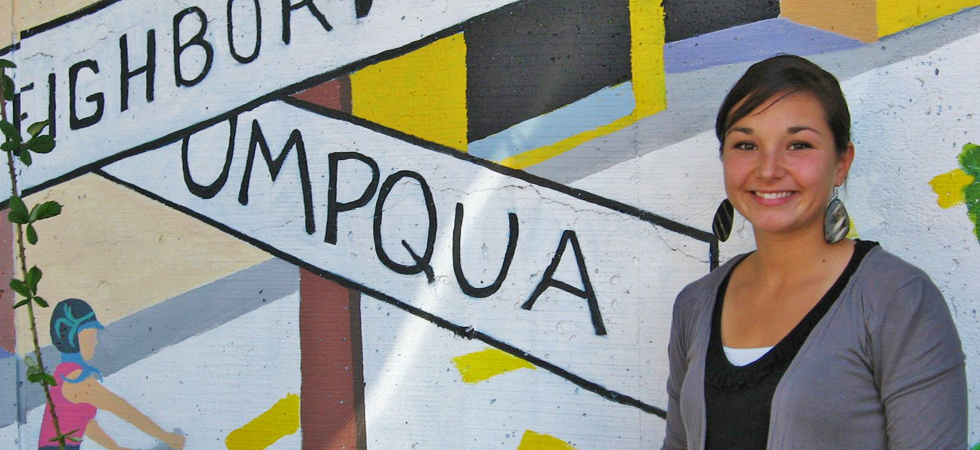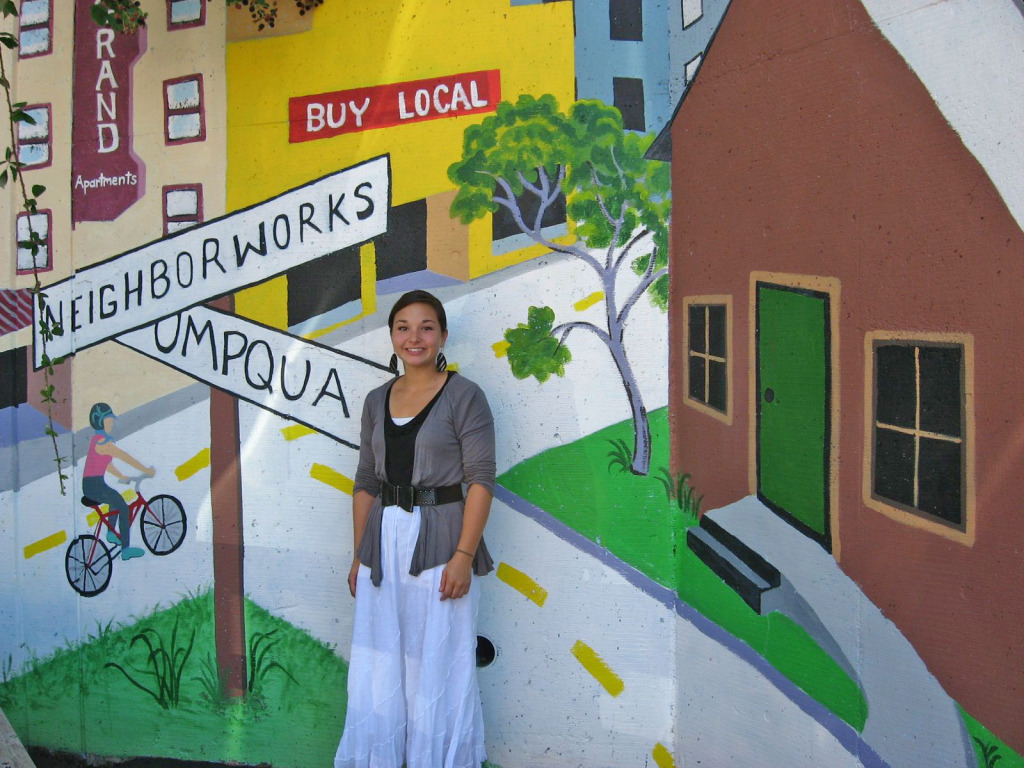Prior to hearing about the IDA program, Rozalyn Patrick, known as Roz, had tried to figure out on her own how to get a computer in her home, but saving small amounts of money in a piggy bank was not getting her to her goal any time soon.
When she was a freshman at Sutherlin High School, Rebekah Barger of Neighborworks Umpqua visited her class and told her about the Youth 3As IDA program, where a young person could participate in a matched savings program for an artistic, athletic, or academic asset.
Rebekah describes how the “program empowers youth to become engaged and invested…while at the same time allowing their parents, especially those who are having a tough time choosing between needs and wants for their children, to step back and let the program teach their kids about financial responsibility [and be] invested personally in those purchases.”
Roz immediately signed up and saved by working various household jobs to help her aging grandmother. Roz would put half of that earned money in her IDA towards a laptop and the other half in a Dream$avers IDA towards future college tuition. After 2 years of saving, the laptop she purchased with her Youth IDA was the first computer in her household. She used it mainly for homework and projects, but an unexpected benefit of having it at home was researching and applying for scholarships for college.
Her parents also felt the benefits of having a computer at home, and Roz commented that “saving on my own took pressure off of them, because laptops can be spendy and I was able to get the kind of laptop I wanted after doing all of my own research on what I needed to succeed. It was my first independent, responsibility type of thing – so that was really neat”. In general, saving was a pretty new thing for Roz. While she was familiar with the concept of saving, it was without a savings account or the financial literacy foundation the IDA program provides. Roz talks excitedly of learning about budgeting, credit cards, and other “grown up stuff” like maintaining an emergency savings account that is separate from her saving for college.
When Roz looks at her friends and peers who did not take advantage of the IDA program she says she’s proud of herself, because she realizes how learning all of those things about financial management have positively affected the path her life is taking.
Rebekah echoes that sentiment when she explains that “Financial Education is extremely important to our youth because high-school students are so eager to be independent but have no real concept of how much that costs. Financial Education gives them the opportunity to really examine the real costs of being on your own and living on your own, in addition to providing the tools to identify ways to stay out of trouble in the future.”
Roz recognizes the value of the many people NeighborWorks Umpqua introduced her to and acknowledges that those relationships helped her “explain to my parents and make them feel more comfortable with letting me take on such big responsibilities. …My mom also came to a few classes and my parents recognized that they had made financial mistakes as well. …They had wanted to explain it to me, but they didn’t know quite as well as Rebekah did. So that helped as well because it made it easier to learn the right way and the things that [my parents] missed out on…”
Rebekah talks about the enthusiasm and energy that Roz brought to the classes. She says that “because Roz is who she is, she was really good about latching on to the littlest, quietest kid and getting them to engage. When we did group activities, she was really good at getting them involved and participating. We could all see that it made a difference in not only the group dynamics, but that participant’s experience as well.” Rebekah went on to describe how strong of an advocate Roz was for the program – at one point, she recruited an entire family and all four children ended up enrolling in the Youth 3A’s program!
Roz is already working to expand other opportunities in her community, at NeighborWorks Umpqua she supported various programs administratively during the summer, including her role as the Umpqua Local Goods Specialist. Umpqua Local Goods is a shared commercial kitchen and retail space. Roz helped to develop the commercial use of the kitchen by surveying potential kitchen tenants, developing an equipment list, and researching the license and permitting process. The commercial kitchen is now accessible to IDA participants, among others, who need the space for their small business endeavors. Virginia, her supervisor at NeighborWorks Umpqua, says that she is “amazed at how well organized Roz was working in two offices over the summer. She was fully committed to the process of learning about our project(s) here so she could be most helpful. I was grateful to have her insight and enthusiasm.”
Roz was very excited, in particular, about Umpqua Local Goods because it ties directly into one of her passions for local food movements and their impact on the environment. She is currently a first generation college student at OSU majoring in Environmental Economics and Policy with a minor in Spanish, preparing to head to Chile for a semester-long study abroad program.
Roz talks about how her solid financial habits, IDA savings account, and success at landing scholarships gave her the luxury of only needing to work a part-time job with NeighborWorks Umpqua during the summer, so that she could volunteer for a Salem internship in her field the rest of the time. During the school year, she has noticed that some of her classmates struggle to make ends meet, while she feels more prepared financially and able to focus on what matters to her career – classes, homework, and a research grant with a professor in her department. Roz feels lucky to be going to college without incurring burdensome debt and recognizes that will continue to affect her financial security long after graduating. She wishes more students had the opportunity and continues to tell as many people as possible about the many opportunities the Oregon IDA Initiative provides.





